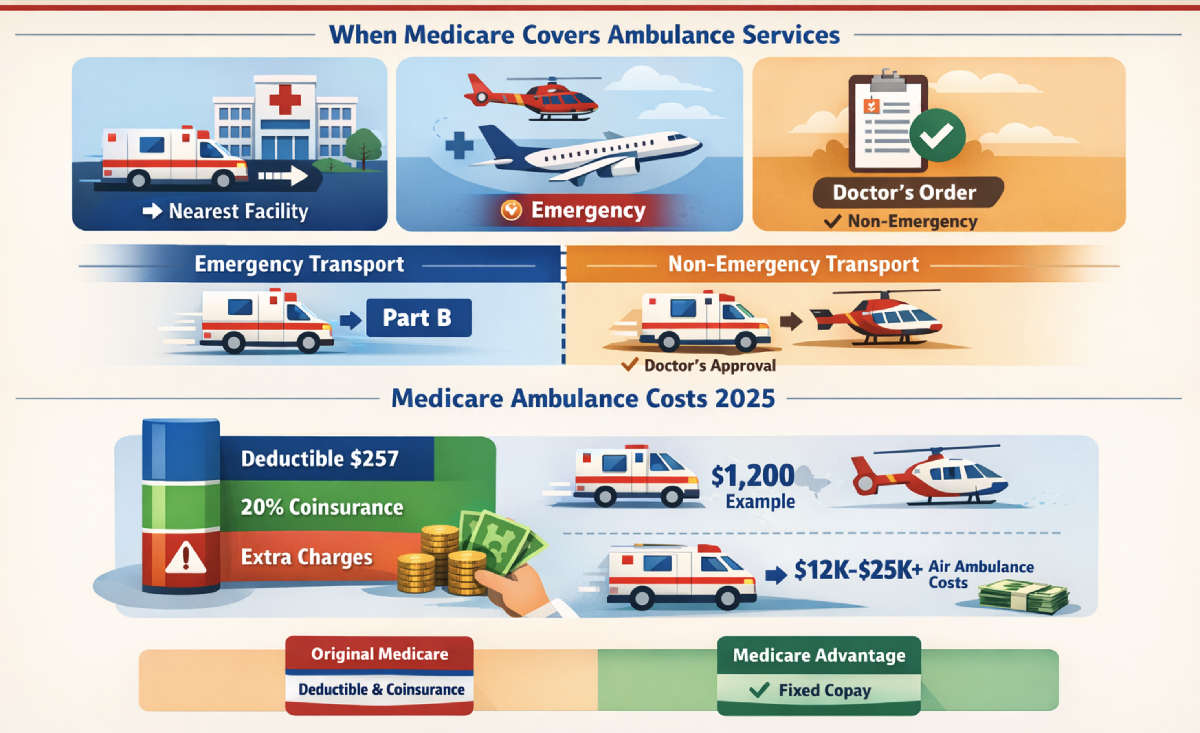If you are wondering does Medicare cover ambulance services, you are not alone. Ambulance rides can be expensive, and Medicare coverage depends on strict medical necessity rules that are easy to misunderstand. This guide explains when Medicare covers ambulance transportation in 2026, when it does not, and what that means for your out-of-pocket costs.
Quick Answer: Yes, Medicare Part B covers ambulance services when they’re medically necessary and no safer transportation is available. But coverage rules, prior approvals, and costs vary depending on the type of service and your Medicare plan.
It’s important to understand which ambulance services are covered by Medicare in 2026, especially as requirements for documentation, provider networks, and billing continue to change. Knowing what’s approved and what isn’t can help you avoid surprise medical bills and make more informed healthcare decisions.
Does Medicare Cover Ambulance Transportation?
Yes, Medicare covers ambulance transportation when it is medically necessary. Coverage is provided under Medicare Part B and applies when your condition makes other forms of transportation unsafe. This includes emergency ambulance services and limited non-emergency situations that meet Medicare’s criteria.
Emergency ambulance transportation is typically covered when immediate medical care is required during transport. Common examples include serious injuries, heart or breathing issues, stroke symptoms, or loss of consciousness. If traveling by car or another non-medical option could endanger your health, Medicare generally considers the ambulance medically necessary.
Medicare may also cover non-emergency ambulance transportation, but only in specific cases. A doctor must document that your medical condition prevents safe transport by any other means. Prior authorization is often required, and claims are frequently denied if documentation is missing or incomplete.
Key Medicare ambulance coverage rules include:
- Coverage falls under Medicare Part B, not Part A
- Transport must be medically necessary, not for convenience
- Medicare typically pays only for transport to the nearest appropriate medical facility
- Non-emergency ambulance rides usually require a doctor’s order and prior approval
- You are responsible for 20 percent coinsurance after meeting the Part B deductible
- Medicare does not cover ambulance transportation simply because a ride is unavailable or for personal comfort. When coverage rules are not met, beneficiaries may be billed the full cost, which makes understanding these requirements ahead of time especially important.
What Medicare Covers for Ambulance Services in 2026
Medicare Part B helps cover ambulance transportation when it is medically necessary and no other safe transportation option is available. This typically includes:
Covered ambulance services under Medicare in 2026:
- Ground ambulance to the nearest hospital or facility that can treat your condition
- Air ambulance (helicopter or fixed-wing aircraft) when ground transport would put your health at risk
- Emergency services for conditions like heart attacks, strokes, or major trauma
- Non-emergency ambulance transport between medical facilities or to a dialysis center, but only with a doctor’s certification and, in some cases, prior authorization
- These ambulance services covered by Medicare must meet strict requirements. Medicare does not approve transport simply for convenience or to see a preferred doctor farther away.
Medicare helps pay for ambulance services when your health makes other transportation unsafe.
This is most common in emergencies such as heart attacks, strokes, or severe injuries.
For non-emergency cases, a doctor must certify that the ride is medically necessary, and sometimes Medicare requires prior authorization.
For a deeper look at how coverage works, check out this comprehensive guide on Medicare ambulance rides
What You’ll Pay for Ambulance Rides in 2026
- Medicare Part B covers 80% of the Medicare-approved amount
- You pay 20% coinsurance after meeting the Part B deductible
- If the ambulance provider doesn’t accept Medicare assignment, you may owe more — known as balance billing
Tip: Many seniors in Tampa use Medigap or Medicare Advantage plans to reduce or eliminate ambulance costs.
To limit costs, many seniors look into supplemental Medicare plans in Tampa or compare Medigap vs. Medicare Advantage.
| Type | Covered by Medicare? | Notes |
|---|---|---|
| Emergency | Yes | 911 calls for stroke, trauma, heart attack, etc. |
| Non-emergency | Sometimes | Must be medically necessary and pre-approved in many cases |
| Scheduled trips | Usually no | Routine doctor visits or patient-requested transport not covered |
Emergency vs. Non-Emergency Transport
Medicare draws a clear line between emergencies and scheduled rides:
- Covered emergencies: 911 calls for strokes, heart attacks, or car accidents.
- Not usually covered: Rides to routine doctor visits or patient-requested trips without medical necessity.
Local seniors can also explore Medicare transportation services in Tampa for recurring medical needs like dialysis.
Medicare Advantage (Part C) and Ambulance Coverage
Medicare Advantage plans must cover at least the same services as Original Medicare, but some go further.
Extra benefits can include lower copays, non-emergency transport coverage, and wellness perks.
If you’re considering a change, review Medicare Advantage plans in Tampa for 2026 and compare local provider networks.
For those unsure, working with a Medicare insurance broker in Tampa can help.
Local Relevance
In Tampa, Hillsborough County Fire Rescue and EMS frequently transport patients to facilities like Tampa General Hospital.
Because many ambulance companies contract with Advantage networks, checking your plan’s details is key.
Resources like the Medicare Tampa Guide can help residents verify which local providers are included.
Supplemental Insurance Options
Medigap policies cover coinsurance and deductibles that Medicare leaves behind.
Popular choices include:
- Plan G: Covers nearly all Part B gaps.
- Plan N: Lower premiums but small copays.
Learn why many seniors choose Medigap Plan G in Florida for stronger protection.
Get the expert support that you need!
People Also Ask: Medicare Ambulance Coverage in 2026
What ambulance services are covered by Medicare in 2026?
Medicare covers emergency ground and air ambulance services when no safer transport is available. Non-emergency transport may also be covered if a doctor certifies medical necessity and prior approval is obtained.
Does Medicare cover ambulance transport between hospitals?
Yes, Medicare may cover medically necessary ambulance transport between hospitals or facilities if the transfer is required for treatment not available at the originating location.
Are air ambulances covered by Medicare?
Air ambulance services are covered when ground transportation could endanger your health. The flight must take you to the nearest medical facility able to treat your condition.
Will Medicare pay for an ambulance if it’s not an emergency?
Possibly. Non-emergency ambulance rides are only covered if your doctor certifies that they’re medically necessary and you meet Medicare’s coverage conditions. Some Advantage plans offer broader transport benefits.
What is balance billing for ambulance services?
If the ambulance provider does not accept Medicare assignment, you may be billed the difference between what Medicare pays and what the provider charges. This is known as balance billing.
How much does a Medicare-covered ambulance ride cost in 2026?
Under Medicare Part B, you typically pay 20% of the approved amount after meeting your deductible. Costs may be higher with out-of-network providers or air transport.
Do Medicare Advantage plans cover more ambulance services?
Yes, many Advantage plans go beyond Original Medicare by covering additional non-emergency medical transport, lower copays, or recurring rides to appointments.
Frequently Asked Questions
Does Medicare cover air ambulance rides?
Yes, if ground transportation would jeopardize your health, and only to the nearest suitable facility.
Do I need prior approval for non-emergency transport?
Yes. A doctor must confirm medical necessity, and some regions require prior approval.
How much does Medicare pay for ambulance services?
Part B pays 80% of costs; you pay the rest after meeting your deductible.
Will a Medicare Advantage plan cover more ambulance rides?
Some Advantage plans expand coverage, so always check the plan’s summary of benefits.
What if the ambulance company doesn’t accept Medicare?
You may face higher charges if the provider refuses Medicare assignment.


